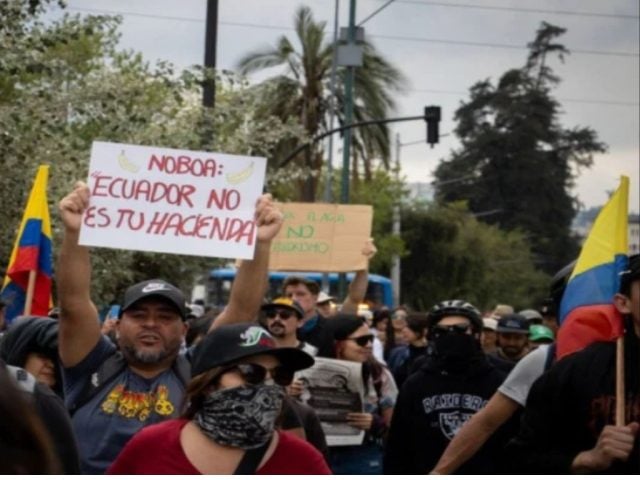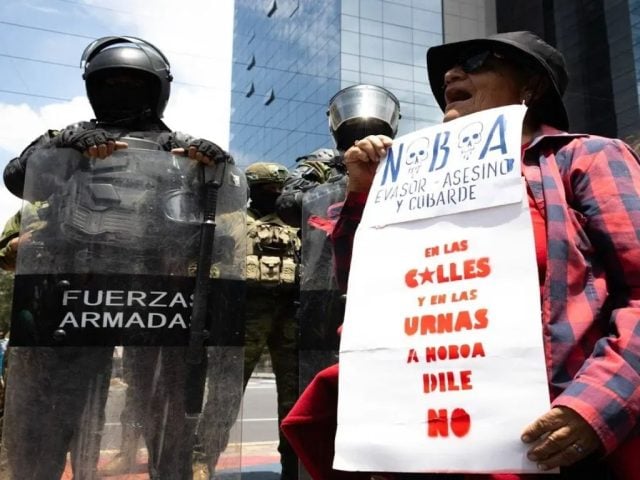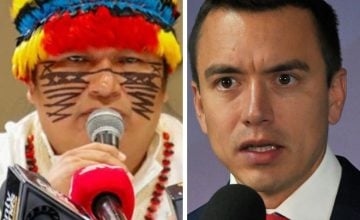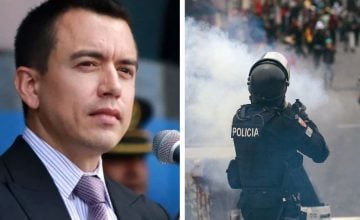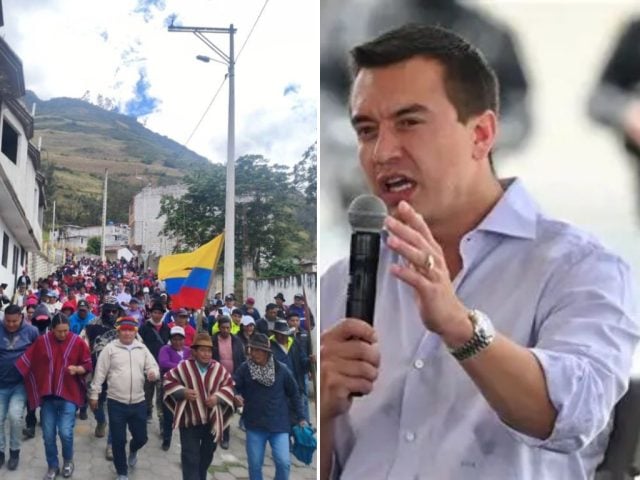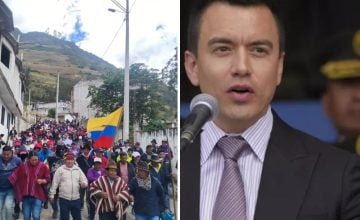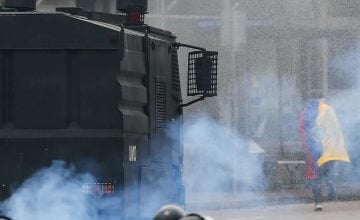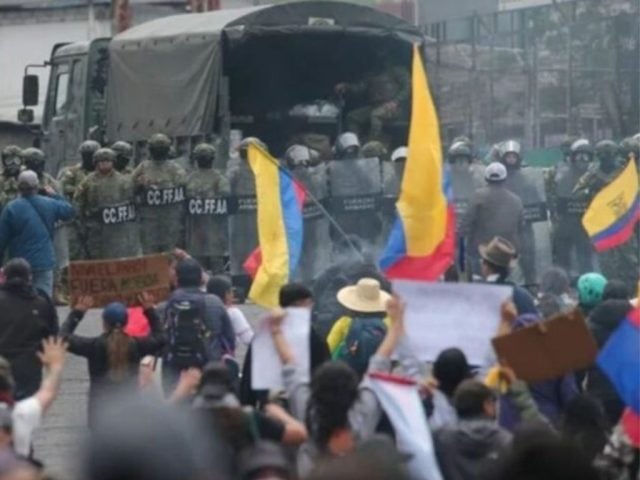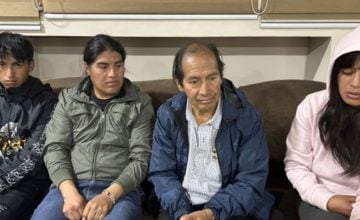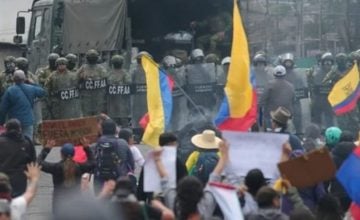Original article: Campaña irrumpe contra ministro «etnocida» de Noboa: “Represión no es seguridad, es terrorismo de Estado”
Through the campaign #FueraReimberg, the Confederation of Indigenous Nationalities of Ecuador (Conaie) has condemned the human rights violations reported during the national strike. They have identified John Reimberg, the Minister of the Interior under President Daniel Noboa, as a primary figure responsible.
«Since the start of Ecuador’s national strike, state forces have acted brutally under the orders of Interior Minister John Reimberg,» the organization stated on their X account.
They denounced the systematic violence perpetrated by the state, asserting that “repression is not security, it is state terrorism. #FueraReimberg.” They called for a day of resistance that took place Sunday on social media, aimed at «breaking the media silence and maintaining the truth» regarding the situation in Ecuador.
In a video shared on Facebook, highlighting the extent of the repression ordered by Noboa’s administration and his Interior Minister, Conaie argued that with every word, Reimberg «justifies more repression, more injuries, and more violence against a people protesting with dignity.»
“While entire communities are under attack, you label as ‘enemy’ the Ecuadorians demanding justice and their rights,» they expressed.
Additionally, they demanded that the right-wing president halt the repression against popular mobilizations and implement measures to address the citizens’ demands.
“Enough with the threats, enough with the internal war. The government of Daniel Noboa must respond with political solutions, not bullets,” they stated.
After four weeks of massive mobilizations, Conaie reaffirmed that the national strike against Noboa and his neoliberal measures remains in effect. This decision follows the public disclosure of the agreements reached between the government and some representatives of the Indigenous movement in Imbabura province.
The protests began in response to Executive Decree 126 signed on September 12, which eliminated the diesel subsidy and raised the price from $1.80 to $2.80 per gallon.
This increase directly affects transport costs, agricultural production, and the household economy of large sectors, particularly Indigenous and rural communities that depend on diesel for their productive and mobility activities. This prompted Conaie, alongside the Unified Workers Front (FUT), the National Coordinator of Students (Conaes), and other groups to declare a state of permanent mobilization.
Demonstrations also reject the lack of medical supplies, the legalization of extractive mining and petroleum in national reserves—including the Galapagos—and the systematic violations of human rights committed since the declaration of “Internal Armed Conflict” by the right-wing government.
In an effort to deactivate the crisis, a dialogue table was established on October 15 in Otavalo between some Indigenous leaders from Imbabura and the Noboa government, following a violent military intervention against protesters in that area.
In this context, the national leadership of Conaie clarified that they were not invited to this negotiation space and accused the government of seeking to fragment the Indigenous movement through partial agreements.
According to reports from TeleSUR, “the grassroots communities supporting mobilizations in various territories also rejected the commitments, claiming decisions were made without prior consultation, and reiterated the continuation of protest measures.”
Thus, the central demands of the strike remain firm, including: the repeal of Decree 126 that eliminated the diesel subsidy; the reduction of the Value Added Tax (VAT) from 15% to 12%; and the rejection of the referendum called by Noboa for November 16, which seeks, among other points, to initiate a process for a new constitutional assembly.
“No provocation should divide us. The resolutions of the Extended Council from October 14 remain in effect, which resolved to reorganize resistance, strengthen unity, reject the Popular Consultation, and reaffirm resistance across all territories,” Conaie asserted.
In line with the Confederation, the Kichwa Karanki people, after a Territorial Assembly, agreed to maintain their participation in the resistance until Decree 126 is repealed. They also announced their commitment to strengthen community organization and their support for the campaign against the “Yes” in the popular consultation promoted by Noboa.
In response, the Executive issued an official statement declaring that “there are no conditions for dialogue”—which they agreed to only after immense pressure from the protesters—and stated they would not accept what they termed “impositions or blackmail.”
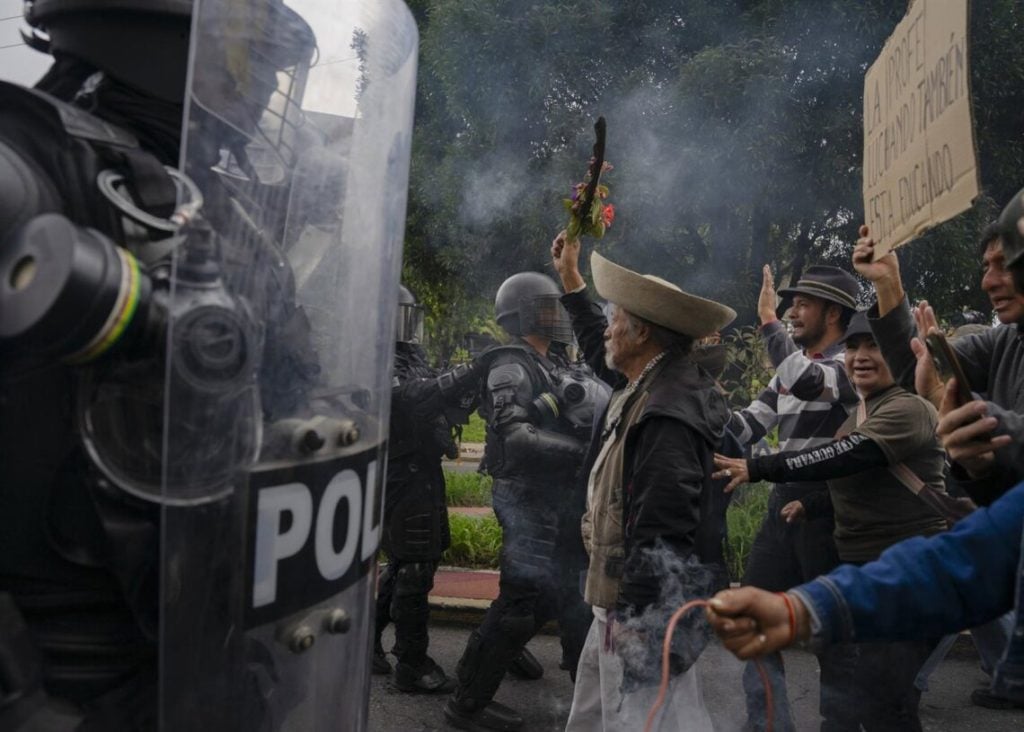
Noboa’s ‘Indiscriminate’, ‘Disproportionate’, and ‘Systematic’ Repression
With this statement, Noboa’s government has dismissed the dialogue process it had convened and warned that it will “act firmly.”
A report published by the Alliance of Organizations for Human Rights (DD.HH) of Ecuador paints a grim picture of the government’s management of the National Strike 2025, accusing President Daniel Noboa of deploying “indiscriminate,” “disproportionate,” and “systematic” repression, leaving behind hundreds of victims and violating fundamental constitutional guarantees.
According to data collected up to October 18, the second weekly bulletin from the Alliance counts 377 human rights violations, 205 detained individuals, 296 injured, 15 temporarily disappeared, and 3 deceased. The document states that during the analyzed week, “repression intensified with massive and disproportionate deployment of military and police forces, one person executed extrajudicially, multiple injuries, arbitrary detentions, and violations of various rights.”
- Illegitimate and Disproportionate Use of Force: The Case of Imbabura
The report focuses its harshest criticism on the military operation deployed in Imbabura province on October 13 and 14. The national government ordered the dispatch of “a military convoy… composed of an additional 5,000 troops on top of the 2,000 already in the area.” This action was officially presented as “humanitarian and productive,” a characterization dismantled by the report citing the Ecuadorian Red Cross, which “refused to participate and reminded, among other conditions, that a humanitarian convoy cannot be controlled or escorted by armed forces.”
The consequences include “the death of José Guamán from a firearm shot,” an 18-year-old who lost a leg, two people with severe eye injuries, and “dozens injured by tear gas impacts and projectiles fired at close range.” The Alliance emphasizes the arbitrariness of the detentions: “Only in Imbabura, 66 detentions were recorded that day, including 7 minors. All individuals were subsequently released, several showing signs of bruising and physical mistreatment, which evidences the illegality and arbitrariness of the detentions as well as the illegal use of force.”
- Violation of University Autonomy and Repression of Students
On October 15, repression escalated to university premises. “National Police officers entered the Central University of Ecuador pursuing peacefully protesting students,” the report stated, adding that “for hours, they launched tear gas and used water cannons within the Faculties, even in spaces where volunteer medical brigades were treating the injured.” The bulletin classified these acts as “a serious violation of university autonomy,” alongside violations of the rights to expression and personal integrity. - Criminalization of Freedom of Expression
The governmental strategy, according to the document, includes a deliberate effort to control the narrative and silence critical voices. “The Regulatory and Control Agency of Telecommunications (ARCOTEL) suspended the frequencies of the community radios Ilumán and Inti Pacha, key media in covering the National Strike,” it reported. These actions are denounced by the Alliance as an “attempt to silence independent press and deny the people’s right to be informed.”
Violence also targeted journalists. “On October 14, journalist Edison Muenala from the community channel Apak TV was shot in the right arm while covering clashes between protesters, police, and military in Otavalo,” the document highlighted.
- Harassment of Communities and Aggression in Quito
The harassment also extended to urban communities in the capital. On October 19, the National Police launched “intense tear gas against the Santa Anita de Calderón and San Miguel del Común communes of the Kitu Kara people in Quito. This affected dozens of families, including children and the elderly.”
The report indicated that on the same day, “the detention of Leonardo Daniel Arriaga Gonzales, 31 years old, who was beaten and forcibly removed from his home in Santa Anita de Calderón” was recorded. According to witnesses cited, “Arriaga had complained to the police about the tear gas directly affecting his home, where a baby was present.”
In a particularly severe incident, “in San Miguel del Común, community member Robert Palacios Samueza was severely injured after being shot in the eye while raising his arms to call for a ceasefire.” The report adds that, according to witnesses, “a police officer was stationed outside the hospital where the victim was being treated.”
- Violation of the Right to Assemble and Public Space
The right to peaceful protest has been annulled by Noboa’s administration. In El Arbolito Park, “police prevented a mass for peace and in memory of the deceased in Imbabura, convened by social organizations and the Lauritas Missionary Sisters.” According to the document, police officers claimed “superior orders,” and “for at least 5 hours, police and military stayed in the park to prevent worshippers from gathering.”
State Violence and Impunity
The bulletin denounces that in the face of the national strike, “patterns of criminalization, abuse of force, and restrictions on the right to social protest have become evident.”
The Alliance warned that “as days go by, state violence against protesters, non-protesters, and communities escalates.”
Moreover, it accused the Noboa government of “twisting figures of international humanitarian law to legitimize its systematic violence” and criticized the notion of a “humanitarian and productive” convoy that, in its wake, “leaves communities tear-gassed, injured, and detained and violates the integrity of ancestral territories.”
The organization alerted that “the illegal use of lethal force is increasing” and that almost a month after the mobilizations in Ecuador began, the toll of dead and wounded indicates that this is no longer an exceptional and justified use of lethal force.
In its report, the Alliance of Human Rights Organizations of Ecuador criticized the inaction of oversight bodies.
“There is no institutional control over the use of force or the actions of the Executive. The oversight and regulatory entities of the State have neglected their duty to investigate and supervise the government’s actions during the National Strike. The integrity of human rights institutions has been ineffective.”
“This inaction undermines institutional independence and favors impunity in the face of human rights violations,” the organization warned.
